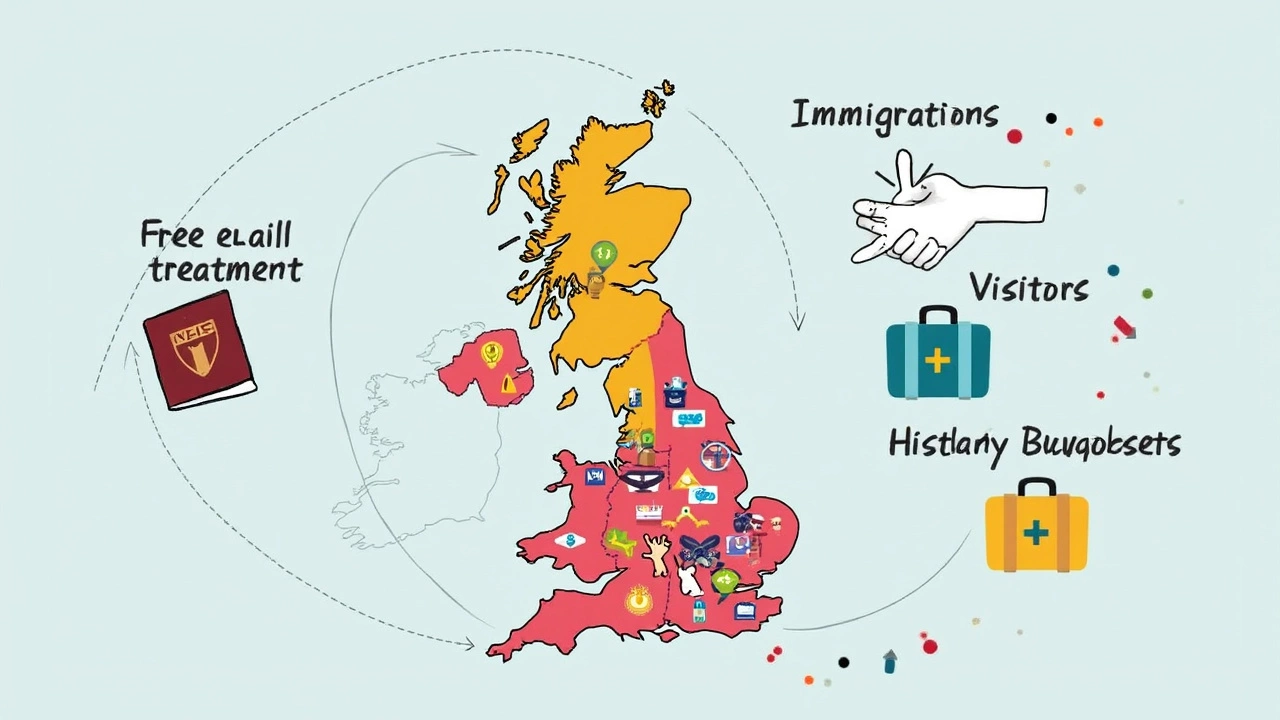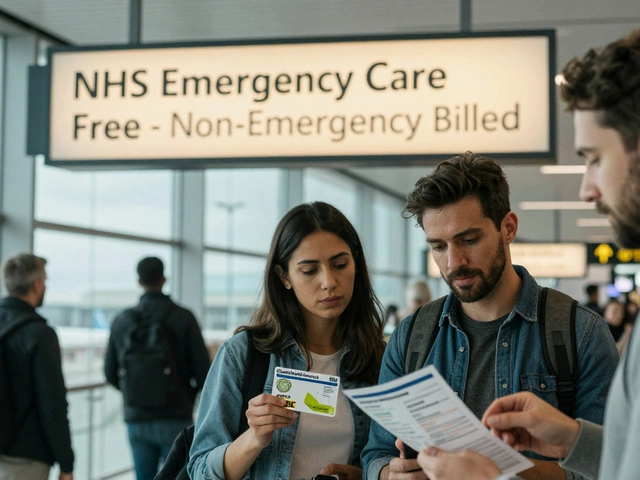Ever worried about getting slapped with a big hospital bill in the UK? You’re not alone. Loads of people panic a bit at the idea of unexpected medical costs, especially with all the stories you hear from other countries. Here’s the real deal for anyone eyeing a hospital stay or even just an emergency A&E visit in Britain—no sugar-coating, just what you need to know right now.
The UK’s NHS (National Health Service) is famous for being mostly free. That’s not just internet hype. As long as you meet certain rules, walking into a hospital won’t usually mean reaching for your wallet. But, before you breathe too easy, not everyone escapes every charge—and there are some exceptions you don’t want to get caught out by. Is being a British resident enough? What if you’re on a student visa, or you’re just on holiday? And is private insurance ever worth it? We’ll break down exactly when you’ll pay, why some folks still do, and share tips so you’re never caught off guard. After all, the only thing worse than being sick is stressing about unexpected fees on top.
- How the NHS Works: Free and Charged Services
- Who Pays for What: Residents, Visitors, and Expats
- When Private Insurance Matters
- Tips to Avoid Unexpected Hospital Bills
How the NHS Works: Free and Charged Services
The NHS covers the bulk of hospital care in the UK, but it’s not totally all-inclusive for every person or every service. As a rule, if you’re classed as “ordinarily resident” in the UK—basically, living here lawfully and settled—you get most treatment for free at the point of use. That includes A&E, GP visits, surgery, and even cancer care. Still, it’s not a free-for-all, and some things will put a dent in your wallet if you’re not careful.
Let’s break down what’s usually included for free and what comes with a cost. First, the free stuff:
- Emergency care (A&E, ambulance rides, urgent surgeries)
- GP services, including consultations
- Hospital stays and most inpatient treatments
- Maternity services
- Testing and scans (like X-rays or blood work)
Here’s where it gets a bit trickier—some services the NHS hospital costs UK won’t always cover, or will only partly cover:
- Prescriptions (usually free in Scotland, Wales, and Northern Ireland, but in England people pay £9.90 per item as of 2025 unless exempt)
- Dental care (NHS dentists charge varying rates, typically £26.80 and up for basic check-ups in England)
- Eye tests and glasses
- Some vaccinations and travel-related jabs
- Private rooms in NHS hospitals
Here’s a quick comparison table to make it clearer:
| Service | Free on NHS? | Notes/2025 Charges |
|---|---|---|
| A&E | Yes | For everyone, even visitors |
| Ambulance | Yes | Within NHS, for emergencies |
| Hospital stays | Yes | For residents, not all visitors |
| Prescriptions (England) | No | £9.90/item |
| Dental check-up | No | From £26.80 |
| Eye test | No | About £25-30 |
| Private hospital room | No | Extra; varies |
No matter your situation, always check what part of the system you’re using—NHS or private. NHS covers your main hospital bills if you’re eligible, but those “extras” can sneak up on you. Prescription charges in England alone land the NHS almost £600 million a year, so it’s not small change. Not sure if a service is free? Ask before you say yes, especially for things outside emergency care or the basics. Better to ask than get blindsided by a random bill.
Who Pays for What: Residents, Visitors, and Expats
This is where things get a bit confusing for a lot of people. Whether you cough up cash for NHS care depends on your status in the UK—so it’s easy to get mixed up. Here’s how it actually works:
- UK Residents: If you live here full-time and your life is based in the UK, the NHS covers you. Most treatment in NHS hospitals is free—including emergencies, surgery, and maternity care. You might still pay for extras like prescriptions, dental check-ups, or a snazzy private room, but not the core hospital stuff. Remember, residency isn’t just about having a UK address; it’s about genuinely living here as your main home.
- Visitors: Coming for a holiday or a quick trip? That’s a whole different story. Generally, you’ll be expected to pay for non-emergency hospital care. Emergency treatment at A&E is free (they’ll stabilise you or handle an emergency), but after that—admissions, follow-ups, or planned treatments—you'll usually get a bill unless you’re from a country with a special agreement. EU visitors, thanks to Brexit, now need a valid GHIC (Global Health Insurance Card) or EHIC to avoid full charges. Don’t chance it—travel insurance is highly recommended.
- Expats: If you’ve moved here but haven’t sorted residency yet (maybe you’re on a work or student visa), you might need to pay the Immigration Health Surcharge (IHS). Paid with your visa, this opens the NHS doors for you for the duration. No surcharge paid? You’ll be treated the same as a visitor and could face big bills for hospital care.
To make it easier, here’s a quick table showing who pays and who doesn’t for hospital costs UK care (not counting prescriptions or dental):
| Status | Emergency A&E | Hospital Admission | Extra Notes |
|---|---|---|---|
| UK Resident | Free | Free | Must have settled residency |
| EU/EEA Citizen (with EHIC/GHIC) | Free | Mostly free | Need valid health card & passport |
| International Visitor | Free | Charged | Travel insurance needed for hospital bills |
| Student/Worker (IHS paid) | Free | Free | Within visa duration |
| Expats (No IHS/No residency) | Free | Charged | Proof of settled status required |
One more thing—refusing to pay legit hospital charges can mess up your visa or future travel. Always double-check before you arrive, and stash your paperwork just in case someone asks for proof at the hospital reception. Nobody wants a big bill when they’re least expecting it.

When Private Insurance Matters
If you’re imagining the UK as a total medical free-for-all, time for a quick reality check. While the NHS covers a lot, private health insurance can matter way more than you’d expect—especially for certain groups or situations. So, when should you really think about getting it or just paying out of pocket?
First, here’s the basic deal. For most regular folks living legally in the UK, the NHS is their main safety net. But private insurance starts to matter if:
- You want to skip long NHS waiting lists. Non-urgent procedures on the NHS (like knee replacements or allergy testing) can take months. Private care gets you seen much faster.
- You need treatment not covered by the NHS. Some new drugs, therapies, or extra tests aren’t always funded, especially in things like fertility treatment or cosmetic surgery.
- You want a private room, or more control over your hospital experience. The NHS mostly sticks with shared wards.
- You’re a visitor, expat, or international student. Some visas require health insurance anyway. Without it, you might end up paying out-of-pocket for non-emergencies—or sometimes even for emergencies if you don’t meet residency rules.
Let’s talk numbers for a sec. Over 4 million people in the UK use private health insurance, according to the Association of British Insurers. Most use it to top up NHS cover, not to replace it. On average, a private hospital stay can cost hospital costs UK users between £1,500 and £3,000 per night for a basic room—easily the price of a small holiday.
| Scenario | NHS Coverage | Private Insurance Needed? |
|---|---|---|
| Routine emergency care | Usually covered | No (if you're eligible) |
| Faster surgery (e.g. knee, hip replacement) | Covered, but long wait | Yes, for speed |
| Advanced cancer treatment (some drugs) | Sometimes limited | Often yes |
| Cosmetic surgery | Rarely covered | Yes |
| Private room | Usually shared only | Yes |
If you’re just visiting, check if you need health insurance before traveling. NHS hospitals do bill overseas visitors for most services (unless it’s an emergency or you’re from a country with a reciprocal agreement). For expats, the NHS surcharge that comes with most UK visas sort of acts as basic cover—but can have limits.
Quick tip: If you get private insurance, always double-check what’s excluded. Things like pre-existing conditions, maternity, or dental care are often left out unless you pay extra.
Here’s the bottom line: private insurance isn’t a must for everyone, but it’s a lifesaver in the right situation. Anytime you want more choice, less waiting, or you don’t fully qualify for NHS, it’s worth a closer look.
Tips to Avoid Unexpected Hospital Bills
Nobody likes a nasty surprise, especially when it comes to hospital bills. The good news is, most people can dodge them in the UK as long as they know the rules. Here’s what you really need to pay attention to, so you don’t accidentally fall into the pay-up crowd.
- Know your residency status. If you’re a permanent UK resident (think: you’ve got the right to live here and it’s your main home), NHS hospital treatment is usually free. But if you’re here on a short visit or your paperwork is still “in progress,” you could be charged—sometimes even if you have a UK address.
- Students studying for more than 6 months? Covered. But you have to pay the immigration health surcharge with your visa application. If you forget or skip this, you’ll definitely get a bill.
- Visiting from the EU with a valid EHIC or GHIC? Emergency treatment (A&E, GP visits) is free, but some ongoing or non-urgent care isn’t. So don’t bank on never paying a penny.
- Coming from outside the EU? Emergency care in A&E is free, but if the hospital admits you or you need specialist treatment, get ready for a bill—sometimes thousands. Always get proper travel insurance before you land here.
- If your situation changes—like your visa expires, or you go from being a visitor to a resident—let the NHS know. They don’t automatically update records and you could get stuck with charges you don’t actually owe.
Here’s a quick cheat sheet to who pays for what at the hospital:
| Group | Emergency A&E | Hospital Admission | Specialist Treatment |
|---|---|---|---|
| UK Resident | Free | Free | Free |
| EU Visitor (EHIC/GHIC) | Free | Sometimes charged | Sometimes charged |
| Non-EU Visitor | Free | Charged | Charged |
| Student visa (IHS paid) | Free | Free | Free |
Some services always cost extra, even for residents. Things like prescriptions (about £9.90 per item in England), dental appointments, and optical care are usually not free. Scotland, Wales, and Northern Ireland have their own rules, and sometimes those services are cheaper—or even free. Double-check if you’re moving around the UK.
Biggest tip: always carry proof of your status (passport, visa, EHIC, or insurance info) if you end up at hospital. They ask. Skip the paperwork, and you could end up paying—or waiting ages for a refund you shouldn’t owe.
Don’t stress, but don’t wing it either. If you’re unsure, ask the hospital overseas visitor team up front before treatment. They deal with hospital costs UK all the time, so they’ll know exactly where you stand.




